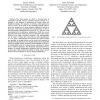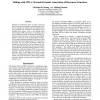566 search results - page 39 / 114 » Artificial Intelligence for Adaptive Computer Games |
CEC
2007
IEEE
15 years 4 months ago
2007
IEEE
— The chaos game, in which a moving point is repeatedly averaged toward randomly selected vertices of a triangle, is one method of generating the fractal called the Sierpinski tr...
AIIDE
2008
15 years 3 days ago
2008
Culture and emotions have a profound impact on human behavior. Consequently, high-fidelity simulated interactive environments (e.g., trainers and computer games) that involve virt...
AIIDE
2008
15 years 3 days ago
2008
Dialogue in commercial games is largely created by teams of writers and designers who hand-author every line of dialogue and hand-specify the dialogue structure using finite state...
AI
2010
Springer
14 years 8 months ago
2010
Springer
Computer systems increasingly carry out tasks in mixed networks, that is in group settings in which they interact both with other computer systems and with people. Participants in...
ICC
2007
IEEE
15 years 4 months ago
2007
IEEE
— For cognitive radio networks, a popular approach to dynamic spectrum allocation (DSA) is game theoretic, which improves spectrum efficiency in a distributed manner. In a doubl...




